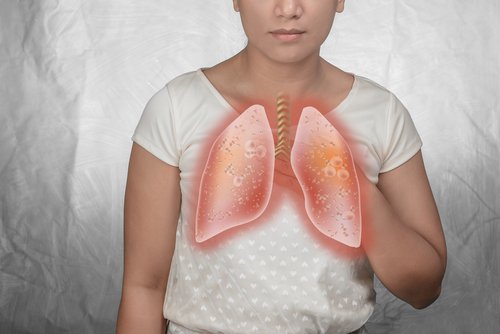NEATstik, a test developed by ProAxsis, shows potential as a quick tool for assessing bronchiectasis severity, the presence of airway infections, and the risk of future disease exacerbations, early data from the BRIDGE clinical study demonstrates.
According to ProAXsis, NEATstik takes only about 10 minutes, can be performed at home, and is able to reproduce the results of sputum culture tests, commonly used to detect infections. Researchers say the new tool could help diagnose chest infections much more quickly — and assist in clinical decisions regarding antibiotics use — as well as identify those at highest risk of infections worsening.
The findings were described in the study “A point of care neutrophil elastase activity assay identifies bronchiectasis severity, airway infection and risk of exacerbation,” published in the European Respiratory Journal.
The neutrophil elastase airway test stik (NEATstik) detects the presence of an enzyme called neutrophil elastase, which is present in lung mucus. This enzyme, which is one of the most destructive enzymes in the body, is released during the body’s natural immune response to infection to kill bacteria. The enzyme is secreted by certain immune cells — neutrophils and macrophages — during inflammation.
As the production of neutrophil elastase increases in people with chest infections, the enzyme can be used as a biomarker of bacterial infections.
NEATstik works by using an antibody that specifically binds to neutrophil elastase, triggering a chemical reaction that produces a colored dye. The assay is based on ProAxsis’ ProteaseTag technology, a platform to identify and quantify active protease biomarkers like elastase.
For NEATstik, the patient provides a sample of sputum (mucus of the lower airways) by coughing into a tube; then the sample is loaded onto NEATstik. If neutrophil elastase is present in the sample, the device produces two colored bands.
The test has been assessed in patients enrolled in the BRIDGE study (NCT03791086) — BRIDGE stands for Bronchiectasis Research Involving Databases, Genomics, and Endotyping — whose primary goal is to establish molecular types of bronchiectasis, which can be used to classify patients by clinical outcomes and guide response to treatments.
In the study, a team led by James Chalmers, PhD, professor at the University of Dundee, used NEATstik to test sputum samples of 124 patients (mean age of 69 years) with stable bronchiectasis. Researchers correlated the test results with the severity of disease, airway infection (confirmed by sputum culture), and exacerbations over the following 12 months.
The data showed that patients testing high for neutrophil elastase activity in NEATstik were more likely to have worse chest infections, and greater frequency of exacerbations. The median time to next exacerbation for patients testing high in NEATstik was 103 days, compared to 278 days in the other patients.
Importantly, the test was able to replicate the results of sputum cultures, with the advantage that it took only 10 minutes to provide a result.
The NEATstik test “provides assessment of NE [neutrophil elastase] activity from sputum in minutes, and identifies patients at increasing risk of airway infection and future exacerbations,” the researchers wrote.
Su Kille, a patient with bronchiectasis, believes this test could help warn her of upcoming chest infections. “When I get a chest infection it affects me badly and I can end up with a cough which lasts for weeks on end,” she said in a Dundee story written by Grant Hill.
“At the moment I have to give a mucus sample and wait two or three days before I can get the right antibiotics to deal with the infection, by which time my symptoms have deteriorated. Being able to take a test at home would let me identify the infection earlier, reducing the damage to my lungs, and helping me get back to normal as quickly as possible,” Kille explained.
Chalmers believes the NEATstik test can quickly assess who is at risk of infection, and who is in most need of urgent treatment, which ultimately should help doctors treat patients at a much earlier stage.
David Ribeiro, CEO of ProAxsis, said in a company press release: “We’re delighted that NEATstik has performed so effectively in this critically important study, and we look forward to continuing to collaborate with this group of expert clinicians to maximize the availability of this novel test for centres caring for patients with chronic respiratory diseases.”

